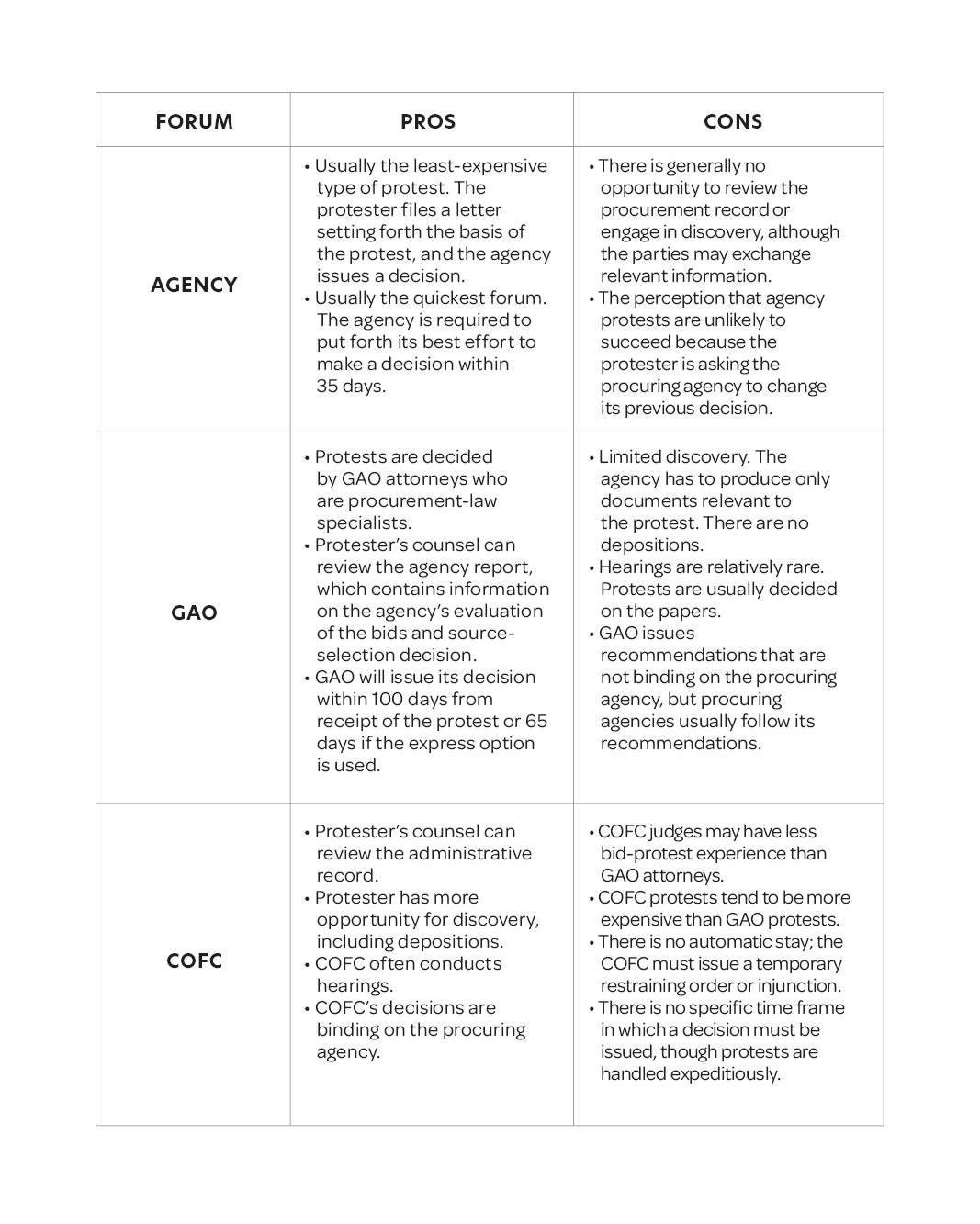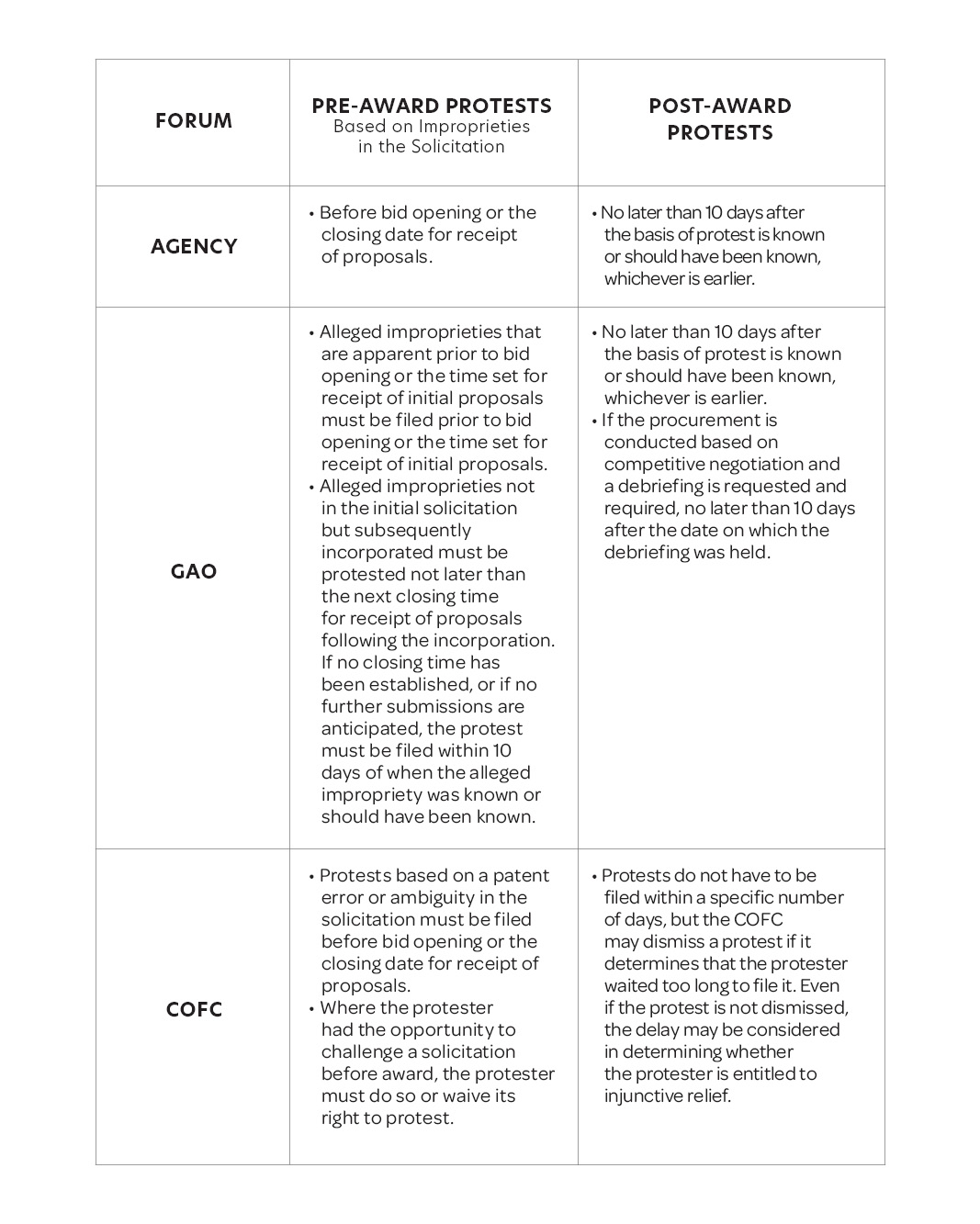The vast majority of federal government contracts are awarded based on competitive procurements through either sealed bids or competitive proposals. Bidders in procurement, though, will occasionally come to believe the government’s solicitation was defective or the award decision unreasonable. In such cases, the unsuccessful bidder may want to file a bid protest. What does that entail?
Common Bases of Protest
Pre-award bid protests, generally, are challenges to the terms of the solicitation. Some common ones posit that:
- The solicitation is unduly restrictive of competition (i.e., it contains unnecessary requirements that the bidder cannot meet or that favor one bidder over another).
- The solicitation is ambiguous, contains conflicting terms or violates a statute or regulation.
- The bidder did not have enough time to prepare a bid or proposal.
Post-award bid protests, by contrast, are typically challenges to the agency’s evaluation of the bids/proposals or the award decision, although the bases of post-award protests vary depending on whether the procurement was sealed-bid or competitive negotiation. Some common bases for sealed-bid procurements claim that:
- The awardee’s bid was nonresponsive (i.e., it failed to conform to the solicitation’s essential requirements or specifications), or the agency improperly determined that the protester’s bid was nonresponsive.
- The awardee failed to meet definitive responsibility criteria (e.g., a license, permit or level of experience), or the agency improperly determined that the protester did not meet definitive responsibility criteria.
- The awardee’s bid was late, or the agency improperly determined that the protester’s low bid was late.
Some common bases of post-award protests on competitively negotiated procurements include claims that:
- The agency’s evaluation of proposals or its award decision was unreasonable or not in accordance with the evaluation criteria.
- The agency used unstated evaluation criteria.
- The agency failed to conduct meaningful discussions with the protester (i.e., did not identify significant weaknesses or deficiencies in the proposal).
Who Can Protest?
To file a protest, the protester must be an interested party. An interested party is an actual or prospective bidder whose direct economic interest would be affected by the award or failure to award a contract. For pre-award protests, any bidder who intends to submit a bid is an interested party. For post-award protests, any bidder who would be in line for award if the protest were sustained is an interested party.
Where Can a Protest Be Filed?
Bid protests can be filed in three forums: (1) the agency that issued the solicitation; (2) the Government Accountability Office (GAO); or (3) the Court of Federal Claims (COFC). Agency-level protests can be filed with the contracting officer or a level above the contracting officer.
There are pros and cons for each forum.

Time to Protest
There are complex rules about when pre-award and post-award protests must be filed, and late protests will almost always be dismissed. Below is some general information, but the protester should consult with counsel regarding the applicable time frame in which to file a protest.

Automatic Stay
When in place, an automatic stay stops the agency from awarding the contract if it has not yet been awarded or from permitting the contractor to perform the work if the contract has been awarded while the protest is pending. Automatic stays are available in both agency and GAO protests. There is no automatic stay in COFC protests; instead, the protester must seek a temporary restraining order and injunction.
To be granted an automatic stay, the protester must follow strict timing requirements. If the award has not yet been made, filing the protest will stay the award of the contract. If the award has been made, filing the protest will stay performance of the contract if the agency protest is filed or the GAO notifies the agency that a protest has been filed within: (1) 10 days after contract award; or (2) five days after a debriefing date offered to the protester when the protester made a timely request for a required debriefing. The agency, however, may override the automatic stay if it determines that there are “urgent and compelling” circumstances.
Protest Remedies
Protest remedies can vary to a certain extent based on the protest forum. In agency protests, the agency may act upon the recommendation of the GAO if the protest was filed there, as well as pay appropriate costs, which typically encompass the costs of filing and pursuing the protest, including reasonable attorney, consultant and expert witness fees. The agency also may pay bid and proposal preparation costs, though agencies generally will not pay these if the protester, as part of the remedy, will be given another opportunity for its bid or proposal to be considered for award. The agency will not pay lost profits.
The GAO may recommend as well that the agency do one or more of the following:
- Refrain from exercising options under the contract;
- terminate the contract;
- recompete the contract;
- issue a new solicitation;
- award a contract consistent with statute and regulation; or
- issue any other recommendation(s) that GAO determines necessary to promote compliance.
The GAO may recommend that the agency reimburse the protester for the cost of filing and pursuing the protest, including attorneys’ fees and consultant and expert witness fees, although usually at a reduced hourly rate. It may also recommend that the agency pay the protester its bid and proposal preparation costs in those limited circumstances in which the protester will not have another opportunity for its bid or proposal to be considered for award. The GAO will not recommend that the protester receive lost profits.
The COFC may award any relief that it considers proper. Monetary relief is limited to bid preparation and proposal costs. Regarding attorneys’ fees, the COFC can award attorneys’ fees only under the Equal Access to Justice Act (EAJA) to a limited class of protesters. Under the EAJA, a protester is entitled to attorneys’ fees only if the following conditions are met:
- The fee application is submitted within 30 days of final judgment and is supported by an itemized statement;
- at the time the protest was initiated, the protester, if a corporation, must not have been valued at more than $7 million in net worth or employed more than 500 employees;
- the protester is the prevailing party;
- the government’s position was not substantially justified; and
- no special circumstances exist that would make an award unjust.
Conclusion
If a disappointed bidder believes that a procurement was conducted unfairly or the award decision was flawed, filing a bid protest can provide the bidder with another opportunity to potentially obtain an award. Protesters need to carefully review their options for where (and when) to file a protest. Bid protest rules can be complex; as such, protesters should discuss their options with experienced bid protest counsel.
Lori Ann Lange is a Partner and serves as Co-Chair of Peckar & Abramson's Government Contracting & Infrastructure practice, leading the firm's federal government contracting efforts. She specializes in government contract law, bid protests, and corporate compliance counseling. Lori represents a range of government contractors, including construction contractors, major defense contractors, informational technology contractors, and service contractors.




























